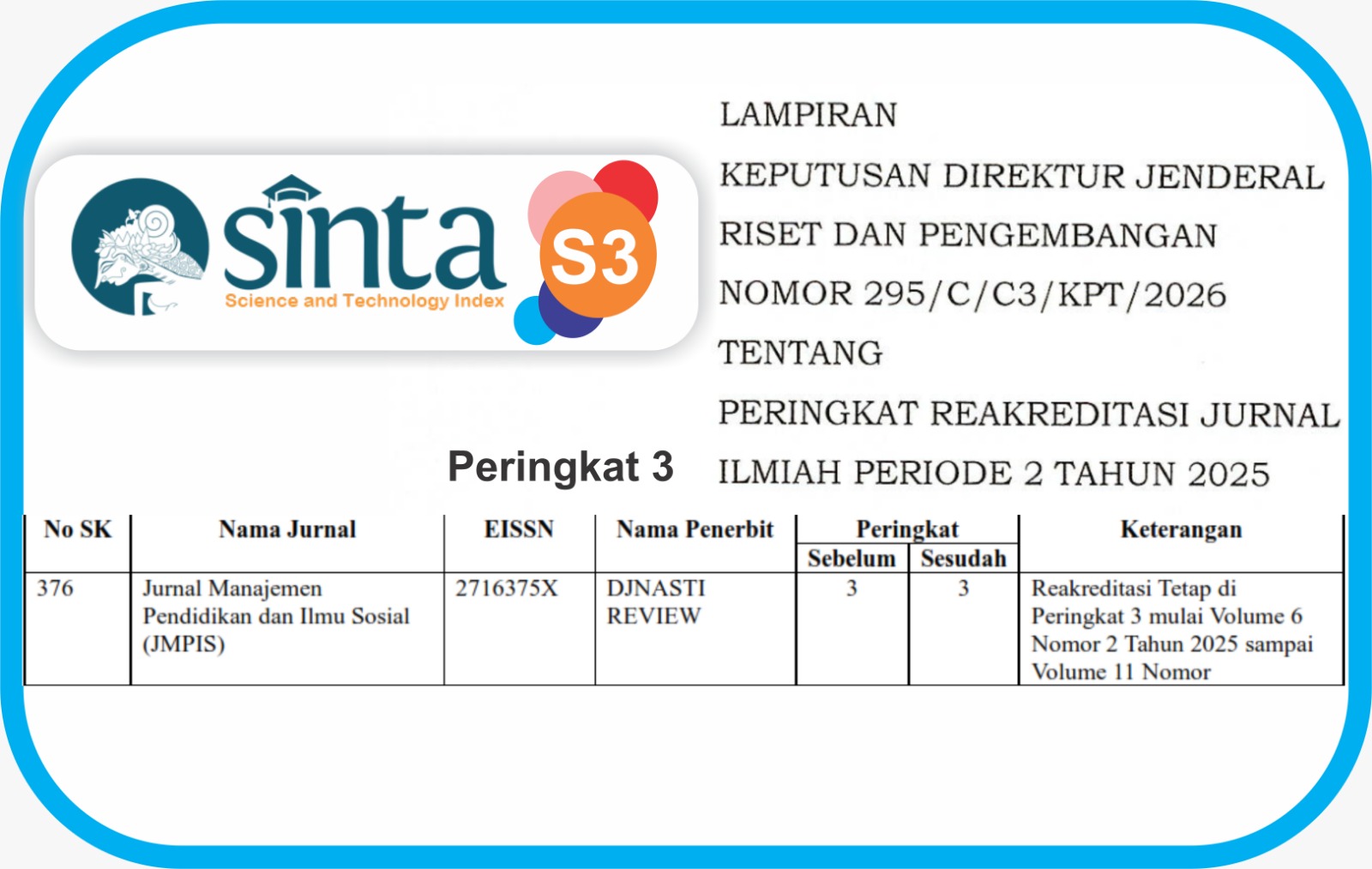Sosialisasi dalam Keluarga Terhadap Pembentukan Akhlak Anak
DOI:
https://doi.org/10.38035/jmpis.v5i3.1976Keywords:
Sosialization, Family, Moral FormationAbstract
Socialization is a process in which a person gets new things from other people. This new thing can be in the form of knowledge or experience. This is how this concept is defined generally within the scope of sociological studies. Each individual's socialization environment is different. Starting from the smallest environment, such as family, close friends, then to the wider community and even worldwide. A person's personality can be formed after receiving what is given within their scope or environment as a function of socialization. A child's personality or morals can easily be obtained from the family environment. How to socialize in the family so that good morals are formed for children. One way is to teach good religious and social norms, apart from that, the most important thing is to provide a good role model or example. This research uses a qualitative descriptive method, namely field study. Researchers process data from the field using a qualitative approach, where the data obtained is the result of the researcher's observations. The research results show that among the many factors that influence the formation of children's morals, family socialization is the main factor for the formation of children's morals. Because family is the closest small group.
References
Bahri, Syaiful, Pola Komunikasi Orang Tua Dan Anak Dalam Keluarga, (Jakarta: PT Rineka Cipta), 2004
Damsar, Pengantar Sosiologi pendidikan, (jakarta : Kencana) 2015
Darajat, Zakiyah, Ilmu Jiwa Agama, (Jakarta : Bulan Bintang), 1989
Hidayat, Rahmat, Sosiologi Pendidikan Emile Durkeim (Jakarta: Raja Grafindo Persada), 2016
Hurlock, Elizabeth, Perkembangan Anak. (Agus Dharma, Ed) (Jilid 1). Jakarta: PT Gelora Aksara Pratama,1998
Latuheru, R. D., & Muskita, M, Enkulturasi Budaya Pamana, Jurnal Badati, 2(1), 2020
Mansur, Pendidikan Anak Usia Dini Dalam Islam, (Yogyakarta: Pustaka Pelajar), 2005
Marzuki, Prinsip Dasar Akhlak Mulia (Pengantar Studi Konsep-konsep Dasar Etika dalam Islam), (Yogyakarta: Debut Wahana Press) 2009
Munisa, Pengaruh Sosialisasi Dan Tingkat Pemahaman Masyarakat Terhadap Minat Pembuatan Akta Kematian di Desa Purworejo, Jurnal Ilmiah Online, 13(1), 2020
Nata, Abuddin, Akhlak Tasawuf dab Karakter Mulia, (Jakarta: PT. RAJA GRAFINDO PERSADA) 2015
Oktovie Ekgea Sawitri dkk, Sosialisasi Keluarga Dalam Membentuk Kepribadian Anak (Studi Pada Keluarga Rumah Tangga Guru Ma Islamiyah,(Jurnal Sosialisasi ) Vol. 8, Nomor 2, Juli 2020
Rina Bastian, Syur’aini, Ismania, Pengaruh Sosialisasi Dalam Keluarga Terhadap Perkembangan Sosial Anak Usia Dini Di Masyarakat Desa Koto Lamo Sumatera Barat, (Indonesian Journal Of Adult and Community Education), 2020
Rusdin, Pohan, Metodologi Penelitian Pendidikan, (Yogyakarta: Ar-Rijal Institute), 2007
Setiadi. Elly. M Dan Kollip Usman, Pengantar Sosiologi, (Jakarta: Kencana), 2010
Sugiyono, Metode Penulisan Kuantitatif Kualitatif Dan R&D (Bandung: Penerbit ALFABETA) 2020
Yahya, Yudrik. Psikologi Perkembangan, (Jakarta: Kencana), 2011
Yulia, Fitri, Peran Keluarga Bekerja Dalam Memsosialisasikan Nilai Agama Pada Anak Di RT 02 RW 02 Desa Tarai Bangun Kecamatan Tambang Kabupaten Kampar, JOM FISIP VOL. 5 NO. 1 – April 2018
Yunahar Ilyas, Kuliah Akhlak, (Yogyakarta: Pustaka Pelajar Offset), 2006
Zainal Arifin, Sosiologi pendidikan, (Gresik: Penerbit sahabat Pena Kita), 2020
Downloads
Published
How to Cite
Issue
Section
License
Copyright (c) 2024 Hidayatun Ni’mah, Abdul Hadi, Muhammad Hambal Shafwan

This work is licensed under a Creative Commons Attribution 4.0 International License.
Hak cipta :
Penulis yang mempublikasikan manuskripnya di jurnal ini menyetujui ketentuan berikut:
- Hak cipta pada setiap artikel adalah milik penulis.
- Penulis mengakui bahwa Jurnal Manajemen Pendidikan dan Ilmu Sosial (JMPIS) berhak menjadi yang pertama menerbitkan dengan lisensi Creative Commons Attribution 4.0 International (Attribution 4.0 International CC BY 4.0) .
- Penulis dapat mengirimkan artikel secara terpisah, mengatur distribusi non-eksklusif manuskrip yang telah diterbitkan dalam jurnal ini ke versi lain (misalnya, dikirim ke repositori institusi penulis, publikasi ke dalam buku, dll.), dengan mengakui bahwa manuskrip telah diterbitkan pertama kali di Jurnal Manajemen Pendidikan dan Ilmu Sosial (JMPIS).











































































